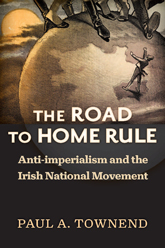|
The Road to Home Rule
Anti-imperialism and the Irish National Movement
Paul A. Townend
History of Ireland and the Irish Diaspora
James S. Donnelly, Jr., and Thomas Archdeacon, Series Editors
How dislike of British global imperialism advanced the Irish independence movement
In the 1870s and 1880s, as the United Kingdom avidly built its empire in Asia and Africa, its rampant expansionism came under the scrutiny of its first and oldest colony, Ireland. Some Irish considered themselves loyal subjects and proud participants in the imperial enterprise, but others drew sharp analogies between the crown’s ongoing conquests of distant lands and its centuries-old oppression of their homeland. The Irish were aware of how the British army had brutally suppressed Afghans, Egyptians, Zulus, and Boers—and how returning troops were then redeployed to quash dissent in Ireland. In Irish eyes, misrule by British officials and absentee landlords mirrored imperial oppression across the globe.
Paul Townend shows that a growing critique of British imperialism shaped a rapidly evolving Irish political consciousness and was a crucial factor giving momentum to the Home Rule and Land League campaigns. Examining newspaper accounts, the rich political cartoons of the era, and the rhetoric and actions of Irish nationalists, he argues that anti-imperialism was a far more important factor in the formation of the independence movement than has been previously recognized in historical scholarship.
 Paul A. Townend is a professor of British and Irish history at the University of North Carolina, Wilmington. He is the author of Father Mathew, Temperance, and Irish Identity and the coeditor of Ireland in an Imperial World.
Paul A. Townend is a professor of British and Irish history at the University of North Carolina, Wilmington. He is the author of Father Mathew, Temperance, and Irish Identity and the coeditor of Ireland in an Imperial World.
Praise
“A bold and original interpretation in which empire emerges as the essential context—rather than a mere sideshow or backdrop—for the rise of Irish nationalism. To find the origins of Home Rule, we will now need to look not simply at the internal politics of the United Kingdom but at Irish responses to events in India, Egypt, Sudan, and South Africa.”
—Kevin Kenny, Boston College
|

Larger images
November 2016
LC: 2016012948 DA
336 pp. 6 x 9
21 b/w illus.
|

